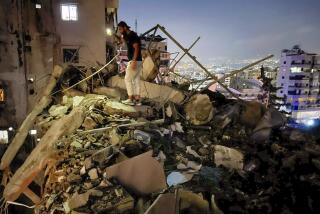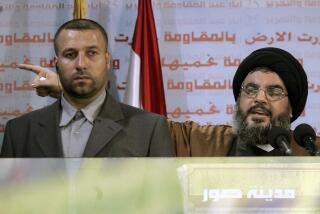Bulgaria accuses Hezbollah of 2012 attack on Israeli tourists
- Share via
JERUSALEM — Bulgarian investigators said Tuesday that the Lebanese group Hezbollah was responsible for a July bus bombing that killed five Israeli tourists and their Bulgarian bus driver in the Black Sea resort of Burgas, as Israel had asserted.
The announcement was certain to heighten pressure on the European Union to join Israel and the United States in labeling Hezbollah a terrorist group, allowing law enforcement agents in Europe to seize assets, restrict travel and arrest members.
Bulgarian officials said two of the three suspects in the attack entered the country with Canadian and Australian passports.
“We have well-grounded reasons to suggest that the two were members of the militant wing of Hezbollah,” Interior Minister Tsvetan Tsvetanov told reporters. “We expect the government of Lebanon to assist in the further investigation.”
Tsvetanov said evidence showed that the men received funding and instructions from Hezbollah. One of the attackers died in the bombing.
Hezbollah, which is part of the ruling coalition government in Lebanon, has denied any role in the attack.
Israeli Prime Minister Benjamin Netanyahu said the findings bolstered his country’s long-standing call to ostracize Hezbollah and its financial backer, Iran.
“This is yet a further corroboration of what we have already known, that Hezbollah and its Iranian patrons are orchestrating a worldwide campaign of terror that is spanning countries and continents,” Netanyahu said in a statement. “We hope the Europeans draw the necessary conclusions regarding the true nature of the Hezbollah.”
The Bulgaria attack was widely seen as part of the shadow war between Israel and Iran. Israel has accused Iran of planning and orchestrating attacks against its citizens in numerous countries, including Thailand, Kenya, India and Georgia. Iran accuses Israel of covertly assassinating several of its nuclear researchers and sabotaging its nuclear facilities.
Bulgarian officials did not link Iran to the bombing.
White House counter-terrorism advisor John Brennan, who is the Obama administration’s nominee to head the CIA, called on Europe to take “action to uncover Hezbollah’s infrastructure and disrupt the group’s financing schemes and operational networks in order to prevent future attacks.”
Hezbollah was already under pressure for its support of Syrian President Bashar Assad in that country’s civil war.
Assad has long served as a major benefactor of Hezbollah and Syria as a conduit for Iranian-made weapons, according to U.S. and Israeli officials.
An Israeli airstrike last week against a Syrian arms convoy near Damascus was intended to prevent Hezbollah from obtaining a cache of antiaircraft missiles.
At home, the group, which was founded in 1982 in response to Israel’s occupation of southern Lebanon, has been criticized by some for fueling sectarian strife and drawing Israel into military conflict with Lebanon, such as the 2006 war.
“If in 2006 Hezbollah played the role of hero in the Arab world, today they are seen very differently because of their support for Assad,” said an Israeli government official who was not authorized to speak publicly. “They are having a difficult year or two. We hope that what happened in Bulgaria, on European soil, will expedite a decision by the EU in the right direction.”
Until now, Europe has been unable to reach a consensus. Countries such as Britain and the Netherlands are believed to support labeling Hezbollah a terrorist group, but France has resisted, fearing that it would destabilize the Lebanese government.
British Foreign Secretary William Hague called on the Lebanese government to cooperate with the investigation.
“It is important that the EU respond robustly to an attack on European soil,” he said. “Every act of terror is an attack on our shared values.”
The office of Catherine Ashton, the European Union’s top diplomat, issued a statement calling for the attackers to be brought to justice but sidestepping the question of whether the EU would designate Hezbollah a terrorist organization.
“The implications of the investigation need to be assessed seriously as they relate to a terrorist attack on EU soil, which resulted in the killing and injury of innocent civilians,” the statement said.
Times staff writer Henry Chu in London contributed to this report.
More to Read
Sign up for Essential California
The most important California stories and recommendations in your inbox every morning.
You may occasionally receive promotional content from the Los Angeles Times.










